
Whiskas Cat Food Ingredients
According to our research, Whiskas manufactures 14 cat food recipes using 73 unique ingredients. To evaluate the quality of ingredients used by Whiskas, we've studied all 73 ingredients. In this article, we'll share our findings on Whiskas ingredients.
| Cat Food Recipes | 14 |
| Unique Ingredients | 73 |
| Artificial Colors | 0 |
| Animal By-Products | 1 |
| Anonymous Meats | 2 |
| Controversial | 9 |
| Harmful | 3 |
First 5 Ingredients
Cat food ingredients in the United States are listed in descending order of pre-cooked weight. The first 5 ingredients typically constitute a significant portion of the recipe.
For Whiskas, these are the most common ingredients found within the first 5 cat food ingredients.
- water sufficient for processing
- chicken
- ground wheat
- soybean oil
- soybean oil
As you can see, the most common first ingredient in Whiskas is water sufficient for processing. The most common 2nd ingredient is chicken, followed by ground wheat, soybean oil, and soybean oil.
Artificial Food Coloring Dyes
Whiskas does not use any artificial food coloring dyes. According to our records, none of the 14 Whiskas cat foods contain artificial food dyes.
Artificial food coloring dyes are unnecessary and potentially harmful ingredients. In general, we not not recommend feeding any pet foods that contain artificial dyes.
In 2010, the CSPI raised serious concerns regarding the safety of many artificial dyes. Most of the studies referenced by the CSPI involved prolonged or excessive consumption. Since most cats consume the same foods throughout their lives, concerns raised by the CSPI are alarming to say the least.
To read more about Artificial Food Dyes, click here.
Animal By-Products
Whiskas does indeed use animal by-products. More specifically, 1 animal by-product ingredient was found during our analysis of Whiskas cat food ingredients.
According to AAFCO, by-products are defined as the non-rendered, clean parts, other than meat, derived from slaughtered mammals. In other words, animal by-products are the leftover ingredients that humans typically do not consume (lung, heart, tongue, stomach, intestine, blood, etc).
Many consumers have equated animal by-products with slaughterhouse waste. Animal by-products are still very controversial. Most premium brands have abandoned them in favor of specific named organ ingredients (duck liver, chicken heart, etc).
If you must feed a product with animal by-products, ensure that the specific animal source is specified. In other words, avoid ingredients such as meat by-products or poultry by-products.
Poultry by-product meal is a controversial ingredient because the source animal is not specified. Anonymous ingredients such as poultry by-product meal are typically low-quality ingredients in comparison to named protein by-product meals (e.g. chicken by-product meal, turkey by-product meal, duck by-product meal).
The following recipes contain poultry by-product meal:
Anonymous Meat Ingredients
Anonymous meats are animal-based ingredients which do not provide the source animal's name. These ingredients are controversial because they can come from almost any animal.
In addition, anonymous animal-based ingredients are very inexpensive and often the lowest quality meats that are still allowed to be used in pet food.
In general, we do not recommend feeding any products which contain anonymous meats. When in doubt, always contact the brand's customer service desk for further clarification.
Unfortunately, we've identified 2 anonymous meat ingredients used by Whiskas.
Animal fat is a by-product of tissue rendering. The source animal is not specific and therefore we cannot be certain that the source does not include diseased animals or even euthanized dogs and cats. What's more, this ingredient is preserved with BHA, an artificial preservative and possible carcinogen according to the World Health Organization.
The following recipes contain animal fat (preserved with BHA and citric acid):
Poultry by-product meal is a controversial ingredient because the source animal is not specified. Anonymous ingredients such as poultry by-product meal are typically low-quality ingredients in comparison to named protein by-product meals (e.g. chicken by-product meal, turkey by-product meal, duck by-product meal).
The following recipes contain poultry by-product meal:
Cereal Grains
Certain Whiskas cat food recipes contain one or more grains. The specific ingredients are listed below.
For cats, we typically recommend choosing a grain-free recipe. Cats are obligate carnivores and therefore grains are not species appropriate.
The kibble production requires a binding agent. Grains are commonly used for this purpose in cat food. When purchasing grain-free cat food, grains are often replaced with another starchy source. This is also not ideal.
To avoid grains and other starchy additions, consider feeding wet or frozen recipes.
Wheat flour is produced by grinding uncooked wheat into a powder. In addition to dietary fiber, wheat flour provides various vitamins, minerals, and plant based protein.
Wheat is considered a controversial ingredient because of it's protein content. Plant based proteins degrade the overall protein quality in the product. In addition, many people believe wheat is one of the most common ingredients to cause food allergies or intolerance. However, grains such as wheat are typically low offenders in comparison to certain protein sources such as beef.
The following recipes contain wheat flour:
Modified corn starch is derived from the endosperm of the corn kernel. The modified term indicates that the corn starch has been treated or processed in order to expose or improve some property. Typically, corn starch is used as a binder in kibble.
The following recipes contain modified corn starch:
Corn gluten meal is a by-product from the production of various corn products (corn starch, corn syrup, etc). It's very high in protein (nearly 60% protein) and therefore can significant boost the protein content of the product. Because plant based proteins such as corn gluten meal are inferior to meat based proteins (lack many essential amino acids), they are not suitable substitutes.
The following recipes contain corn gluten meal:
Brewer's rice is the small fragments of rice kernel that are separated from the larger kernels of milled rice. The fragments do not contain the same nutrition profile of the whole kernel and therefore brewer's rice is a lower quality grain. Brewer's rice is typically regarded as an inexpensive and low quality filler.
The following recipes contain brewers rice:
Ground wheat is regarded as an inexpensive and low-quality filler in pet food. However, wheat does provide plant-based protein and makes pet food more affordable for consumers. It's important to note that plant based protein does not provide the same amino acid profile as meat based protein.
The following recipes contain ground wheat:
Wheat gluten is the main protein of wheat. Although wheat gluten is mostly protein, wheat gluten is considered controversial because it significantly boosts the protein content of the product. This is undesirable because plant based protein does not provide the same amino acid profile as meat based protein.
The following recipes contain wheat gluten:
Ground yellow corn is a cereal grain which provides a modest amount of vitamins, minerals, and plant based protein. It also happens to be one of the most controversial ingredients in cat food.
Proponents of corn claim that corn is highly digestible and an excellent source of protein, energy, vitamins, minerals, and essential fatty acids.
Opponents however believe that positive claims in regards to corn are either half-truths or completely false, we'll discuss a few of the opposing arguments.
In regards to digestibility, the claims of "highly digestible" are only true if corn is processed into a meal or flour and subsequently cooked. In regards to the protein contribution, we must note that corn is a plant based protein which does not contain all of the necessary amino acids required by cats to sustain life. Therefore substituting corn for meat is an unsuitable substitution and actually degrades the overall protein quality of the product.
Finally, we'll discuss the claims about vitamins and minerals in corn. Although corn does provide many vitamins and minerals, it not necessarily an exceptional ingredient in this regards. There are many other ingredients which are more complete and biologically appropriate. Therefore the usage of corn as the primary ingredient in cat food should certainly warrant further questioning.
The following recipes contain ground yellow corn:
Controversial Ingredients
In most cases, ingredients which are given the controversial classification can be substituted with higher-quality alternatives. You should evaluate each controversial ingredient independently to see if there is truly a valid cause for concern.
Keep in mind, certain sacrifices often must be made to produce cat foods at a reasonable price. In general, the more expensive the product, the fewer controversial ingredients you'll find.
In our analysis, we've identified 9 controversial ingredients inside Whiskas products. These controversial ingredients are listed below. Click on each ingredient for more information.
Iron oxide is an FDA approved natural food coloring agent. It's commonly found in rusting metal and provides a reddish-brown color.
We believe food colorants are unnecessary ingredients in cat food. Other than potential harm, food colorants do not provide any nutritional value. These type of ingredients are used only to make the food look appealing to humans.
The following recipes contain iron oxide:
Corn gluten meal is a by-product from the production of various corn products (corn starch, corn syrup, etc). It's very high in protein (nearly 60% protein) and therefore can significant boost the protein content of the product. Because plant based proteins such as corn gluten meal are inferior to meat based proteins (lack many essential amino acids), they are not suitable substitutes.
The following recipes contain corn gluten meal:
Brewer's rice is the small fragments of rice kernel that are separated from the larger kernels of milled rice. The fragments do not contain the same nutrition profile of the whole kernel and therefore brewer's rice is a lower quality grain. Brewer's rice is typically regarded as an inexpensive and low quality filler.
The following recipes contain brewers rice:
Ground wheat is regarded as an inexpensive and low-quality filler in pet food. However, wheat does provide plant-based protein and makes pet food more affordable for consumers. It's important to note that plant based protein does not provide the same amino acid profile as meat based protein.
The following recipes contain ground wheat:
Wheat gluten is the main protein of wheat. Although wheat gluten is mostly protein, wheat gluten is considered controversial because it significantly boosts the protein content of the product. This is undesirable because plant based protein does not provide the same amino acid profile as meat based protein.
The following recipes contain wheat gluten:
Caramel color is a concentrated form of caramel, a natural food colorant. Caramel color has been linked to cancer in laboratory animals. Since our pets do not care about food color, caramel color is an unnecessary addition with possible health risks.
The following recipes contain caramel color:
Ground yellow corn is a cereal grain which provides a modest amount of vitamins, minerals, and plant based protein. It also happens to be one of the most controversial ingredients in cat food.
Proponents of corn claim that corn is highly digestible and an excellent source of protein, energy, vitamins, minerals, and essential fatty acids.
Opponents however believe that positive claims in regards to corn are either half-truths or completely false, we'll discuss a few of the opposing arguments.
In regards to digestibility, the claims of "highly digestible" are only true if corn is processed into a meal or flour and subsequently cooked. In regards to the protein contribution, we must note that corn is a plant based protein which does not contain all of the necessary amino acids required by cats to sustain life. Therefore substituting corn for meat is an unsuitable substitution and actually degrades the overall protein quality of the product.
Finally, we'll discuss the claims about vitamins and minerals in corn. Although corn does provide many vitamins and minerals, it not necessarily an exceptional ingredient in this regards. There are many other ingredients which are more complete and biologically appropriate. Therefore the usage of corn as the primary ingredient in cat food should certainly warrant further questioning.
The following recipes contain ground yellow corn:
Poultry by-product meal is a controversial ingredient because the source animal is not specified. Anonymous ingredients such as poultry by-product meal are typically low-quality ingredients in comparison to named protein by-product meals (e.g. chicken by-product meal, turkey by-product meal, duck by-product meal).
The following recipes contain poultry by-product meal:
Liver is a controversial ingredient because the source animal is not specified. Anonymous animal ingredients are typically very low quality and may contain almost any animal, including dogs and cats!
The following recipes contain liver:
Potentially Harmful Ingredients
Harmful ingredients are those which have been linked to adverse health effects. In general, we do not recommend feeding any product which contains any harmful ingredients.
There are certain situations where these ingredients may be necessary. We always recommend contacting Whiskas for further clarification regarding any harmful or controversial ingredient.
We have identified 3 harmful ingredients used in certain Whiskas recipes. To learn more, click on the ingredient's name.
Animal fat is a by-product of tissue rendering. The source animal is not specific and therefore we cannot be certain that the source does not include diseased animals or even euthanized dogs and cats. What's more, this ingredient is preserved with BHA, an artificial preservative and possible carcinogen according to the World Health Organization.
The following recipes contain animal fat (preserved with BHA and citric acid):
Butylated hydroxyanisole (BHA) is an artificial preservative and possible cancer-causing agent. Studies have show that BHA can be linked to various tumors in laboratory animals.
The following recipes contain BHA:
Butylated hydroxyanisole (BHA) and butylated hydroxytoluene (BHT) are both artificial preservatives. According to the World Health Organization, BHA and BHT are both possible carcinogens.
The following recipes contain BHA/BHT:
- Whiskas Purrfectly Chicken Chicken & Beef Entree
- Whiskas Purrfectly Chicken Chicken & Duck Entree
- Whiskas Purrfectly Chicken Chicken Entree
- Whiskas Purrfectly Fish Oceanfish Entree
- Whiskas Purrfectly Fish Sardine & Mackerel Entree
- Whiskas Purrfectly Fish Tuna & Whitefish Entree
- Whiskas Purrfectly Fish Tuna Entree
- Whiskas Purrfectly Fish With Salmon
- Whiskas Purrfectly Fish With Shrimp
- Whiskas Purrfectly Fish With Snapper
Whiskas Cat Food Ingredient Lists
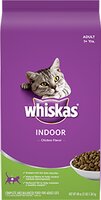
Whiskas
Indoor Cat
Chicken Flavor
Whiskas
Indoor Cat Chicken Flavor
First Five Ingredients
poultry by-product mealground yellow corn
ground wheat
soybean meal
corn gluten meal
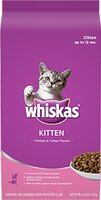
Whiskas
Kitten
Chicken & Turkey Flavors
Whiskas
Kitten Chicken & Turkey Flavors
First Five Ingredients
poultry by-product mealcorn gluten meal
soybean meal
brewers rice
ground yellow corn
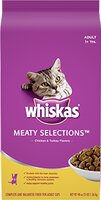
Whiskas
Meaty Selections
Chicken & Turkey Flavors
Whiskas
Meaty Selections Chicken & Turkey Flavors
First Five Ingredients
poultry by-product mealground yellow corn
ground wheat
corn gluten meal
soybean meal
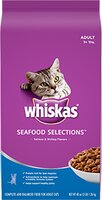
Whiskas
Seafood Selections
Salmon & Shrimp Flavors
Whiskas
Seafood Selections Salmon & Shrimp Flavors
First Five Ingredients
poultry by-product mealground yellow corn
ground wheat
corn gluten meal
soybean meal
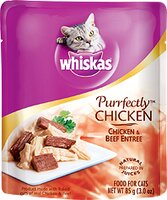
Whiskas
Purrfectly Chicken
Chicken & Beef Entree
Whiskas
Purrfectly Chicken Chicken & Beef Entree
First Five Ingredients
water sufficient for processingchicken
beef
modified corn starch
soybean oil
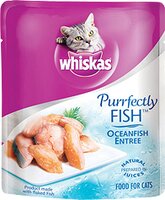
Whiskas
Purrfectly Fish
Oceanfish Entree
Whiskas
Purrfectly Fish Oceanfish Entree
First Five Ingredients
water sufficient for processingsardine
mackerel
soybean oil
carrageenan
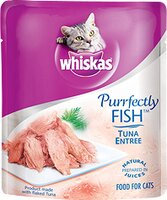
Whiskas
Purrfectly Fish
Tuna Entree
Whiskas
Purrfectly Fish Tuna Entree
First Five Ingredients
water sufficient for processingtuna
soybean oil
tricalcium phosphate
carrageenan
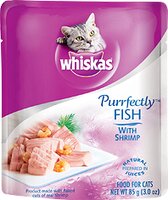
Whiskas
Purrfectly Fish
With Shrimp
Whiskas
Purrfectly Fish With Shrimp
First Five Ingredients
water sufficient for processingtuna
soybean oil
shrimp
tricalcium phosphate
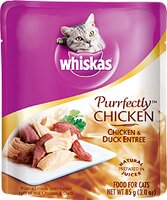
Whiskas
Purrfectly Chicken
Chicken & Duck Entree
Whiskas
Purrfectly Chicken Chicken & Duck Entree
First Five Ingredients
water sufficient for processingchicken
duck
liver
modified corn starch
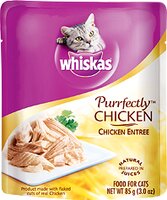
Whiskas
Purrfectly Chicken
Chicken Entree
Whiskas
Purrfectly Chicken Chicken Entree
First Five Ingredients
water sufficient for processingchicken
liver
modified corn starch
soybean oil
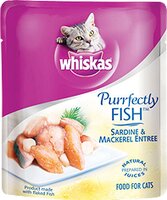
Whiskas
Purrfectly Fish
Sardine & Mackerel Entree
Whiskas
Purrfectly Fish Sardine & Mackerel Entree
First Five Ingredients
water sufficient for processingsardine
mackerel
soybean oil
sole
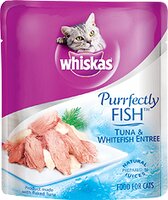
Whiskas
Purrfectly Fish
Tuna & Whitefish Entree
Whiskas
Purrfectly Fish Tuna & Whitefish Entree
First Five Ingredients
water sufficient for processingtuna
whitefish
soybean oil
anchovy
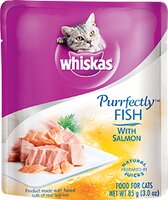
Whiskas
Purrfectly Fish
With Salmon
Whiskas
Purrfectly Fish With Salmon
First Five Ingredients
tunawater sufficient for processing
salmon
chicken
soybean oil
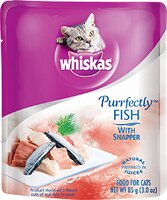
Whiskas
Purrfectly Fish
With Snapper
Whiskas
Purrfectly Fish With Snapper
First Five Ingredients
water sufficient for processingsardine
mackerel
tuna
snapper
